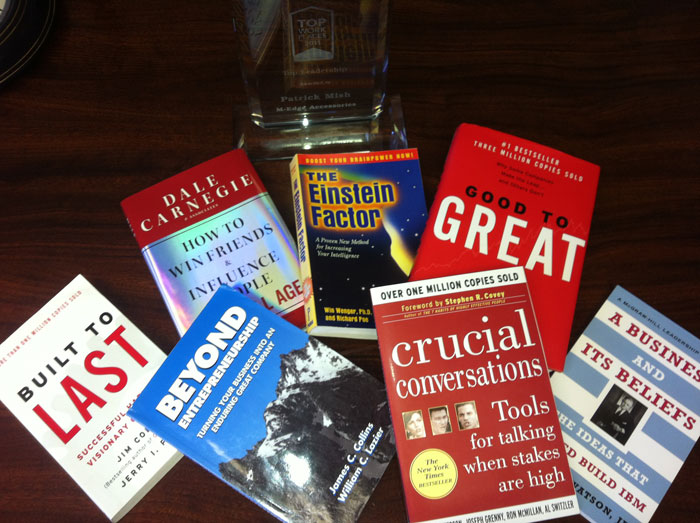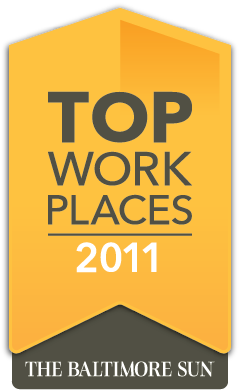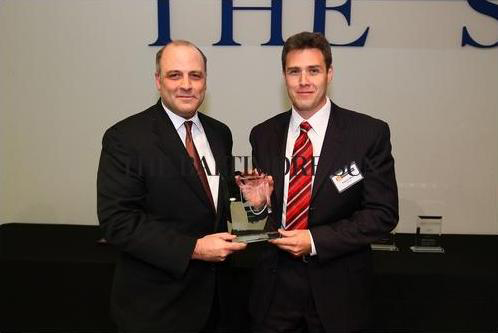The Edge
Vision: a gifted talent or a learned skill?
Posted by Patrick on March 8, 2012I hear people frequently refer to some leaders as visionary--Steve Jobs, clearly probably one of the most frequently referred to people in recent history as visionary. Other visionaries? Tony Hsieh, Sam Palmisano, Lou Gerstner, Sam Walton, Mark Zuckerberg and the list goes on.
Were these folks all born with this remarkable visionary skill, this ability to foresee the future and then create it? Did their DNA come together in a way that positioned them to have this natural talent? Many people believe, yes. You've either got it or you don't. You either have this gift to look out 10, 20, 50 years and see what the future holds and then take steps to make it a reality, or you don't.

In my own research, and through practicing my own trade as co-founder and CEO of a rapidly growing business, I'm not convinced that the you've-either-got-it-or-you-don't thought process applies. What I am convinced about, is that you won't ever be visionary if you don't take the time to step out of the day-to-day of life, and really start to deeply think about what you want out of your own life.
For example, when M-Edge was founded, it was more preparation, good timing, and serendipity that provided the stage for who we are today. It was hardly what I'd consider "visionary"! E-readers were just beginning to get a small amount of traction in 2006; the early-early-adopters were checking these devices out! I just happened to be married to a woman that is a voracious reader. I had a problem that needed to be solved; when traveling to visit my wife's family, she'd bring too many books for me to carry. All of the right pieces were in place--the good timing and serendipity part.
And I had prepared myself. This is what I believe sets the stage for learning how to be visionary. I had taken time out of my day-to-day life to think often and deeply about what I wanted for my own career and life. Through that process, I began to hone in on what I didn't want--spending my days doing something I wasn't deeply passionate about and wasting my talents in an environment filled with mediocrity and bureaucracy. Slowly, and by deliberately practicing thinking about the future and what I want for myself and my family, I began to realize that what I really love is helping people, bringing people together to achieve things we couldn't do ourselves, and building something that makes a contribution to the world. This led me to think that starting my own business would be one of the most interesting and effective ways to truly pursue what I love.
So, in 2006, having spent the time preparing--deliberately stepping out my day-to-day life and thinking about what I want in the long term--and having had the confluence of good timing and serendipity, M-Edge was founded. Then an interesting thing happened. I forgot what I'd learned about taking time out of the day-to-day to think long term. As the business began to gain traction, keeping up with the day-to-day was all that I could focus on. After 3 years, when I took time to look around (was forced to, really, by the pending birth of our second child), I realized I was headed for a place that was no longer in tune with the things that I'm most passionate about.
So, more deliberate practice. I put the day-to-day to the side, and again started to think deeply about the longer term. What's the vision for M-Edge, for myself and my family? Through this process, I realized that I knew very little about being an effective CEO. I needed to learn. So, I dug in and read every piece of work I could get my hands on related to running and growing successful businesses,successful leaders and leadership, and the latest research in psychology (I hadn't realized I needed to know anything about psychology until I started studying successful businesses and successful leaders).

Pictured: The Baltimore Sun awarded M-Edge as one of the top places to work for 2011.
Through this process, I learned how to be a better CEO (I still have a long way to go!), and I learned how to really start to think about the long term more consistently. Now, I set aside time on a weekly basis to think about the long term and specifically, what I want M-Edge to be, what I want us to value, what I want us to contribute to the world, and what I want for our leaders and employees. I also spend time talking to the team about these questions and then discussing and studying: is what we're doing today consistent with where we want to be in the future?
While I'm no visionary in the foremost sense, I have certainly learned how to be consistently forward-looking. I have learned to take the time necessary to think about the long-term and study and research how to address questions that arise during this process of thinking long-term. I continue to get better at this skill every day, and our company and my family is getting better and better at this skill as well. We are all learning and growing and better understanding what the future might look like and how we can take steps today to make it a reality.
So on vision, I firmly believe it's a learnable skill. And with enough deliberate practice, how great of a visionary could you become? Hmmmm...

Pictured:Pat's proudest moment as CEO, accepting his award for Top Leadership in a small business by the Baltimore Sun.
- Top Christmas Apps Posted by on December 15, 2012
- Vintage Halloween Comeback Posted by Shelby on October 31, 2012
- Letter from our CEO Posted by Pat on October 24, 2012
- Top Halloween Apps Posted by on October 15, 2012
- Carbon Fiber is the New Black Posted by on October 9, 2012
- Powerful Women Authors and a Funny Memoir Posted by on September 28, 2012
- Crazy for Hue Posted by on September 11, 2012
- Summer eBook Reviews from M-Edge Posted by on August 20, 2012
- An inside look at our partnership with E-Books for Troops Posted by on August 9, 2012
- Making the video: SuperStylus Posted by on July 27, 2012
- Inspired by disco balls, afros and lava lamps... Posted by Shelby on July 12, 2012
- Behind the scenes with M-Edge Posted by on June 22, 2012
- Something Posted by on June 19, 2012
- M-Edge Trend Watch Posted by M-Edge on June 12, 2012
- A Thank You note from Tori Spelling! Posted by M-Edge on May 29, 2012
- House loves M-Edge! Posted by M-Edge on May 25, 2012
- How I Ate 65 Nuggets Posted by Clark on May 18, 2012
- Hey Girl, at M-Edge Posted by Shelby on May 3, 2012
- So you think you know Social Media? Posted by Stefi on April 26, 2012
- Apple's Rules, Sandboxes, and Bullies Posted by Josh K on April 18, 2012
- Movie review duel: The Hunger Games Posted by Jaime & Victoria on April 11, 2012
- Industrial Design: Where I find inspiration Posted by Simon on April 5, 2012
- Allow us to introduce Tom Posted by Tom F. Olery on March 29, 2012
- Name the M-Edge Blog! Posted by M-Edge on March 26, 2012
- Distance makes the heart grow fonder Posted by Megan on March 22, 2012
- What's in a name? Posted by Aubrey Knight on March 20, 2012
- Anatomy of a Launch: The new iPad Part 2 Posted by Product Development on March 13, 2012
- Vision: a gifted talent or a learned skill? Posted by Patrick on March 8, 2012
- Anatomy of a Launch: iPad 3 Posted by Product Development on March 7, 2012
- Mad (Wo)Men Posted by Sarah on March 1, 2012
- Inspiration for M-Edge Innovation Posted by Genevieve on February 28, 2012
- The Pursuit of Awesomeness Posted by Jackie on February 23, 2012
- M-Edge: Under the Covers Posted by Devon on February 21, 2012




